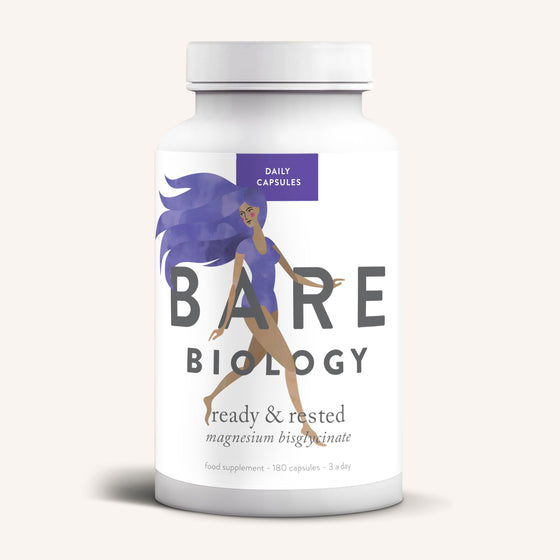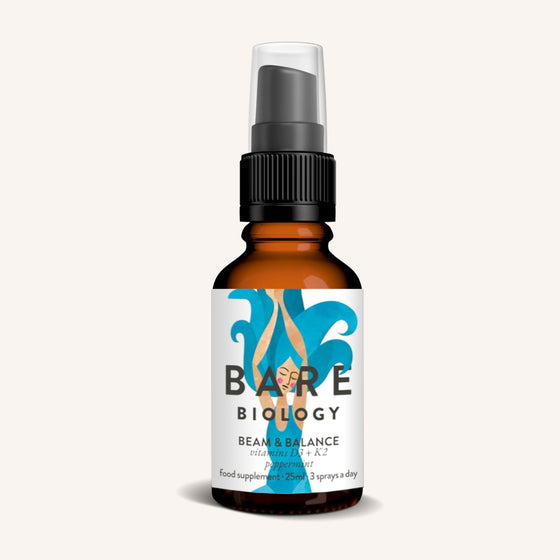Written by Registered Nutritional Therapist Uta Boellinger Dip Nut mBANT rCNHC
There’s a growing awareness that prevention is better than finding a cure and nutrition and lifestyle changes should play a bigger role in our lives. Fortunately, this is resulting in a huge drive towards functional medicine.
As a Registered Nutritional Therapist I found early on in my practice that clients coming to see me for various concerns (fertility, athletic performance and skin health) would often report back that they had experienced reduced stress levels and more stable moods after implementing my recommendations. This soon led me to investigate further and develop a true passion for educating others on this subject. It’s now a major part of my clinical practice.
So what exactly is the link between food and mood you may wonder? Well let me explain. Whilst the body is a complex and fascinating mechanism, which I could talk about for days, I’ll try and keep this simple. It really all comes down to these 5 principles.
1. Mood regulation
Your body needs macro and micronutrients to create hormones and neurotransmitters, which are the chemical messengers regulating EVERYTHING including mood, sleep and stress response. If you don’t provide your body with these building blocks, it may not be able to make adequate amounts of them. As an example, melatonin which regulates our sleep-wake cycle can only be made with sufficient amounts of tryptophan, an amino acid found in protein rich foods as well as oats, bananas and cherries.

2. Brain health
It’s your brain which takes care of your thoughts, movements and your breathing and senses. It works round the clock, even while you’re sleeping. This means your brain requires a constant supply of fuel. That "fuel" comes from the
foods you eat,and what’s in that fuel makes all the difference. Put simply, what you eat directly affects the structure and function of your brain and, ultimately, your mood.
We need nutrients to keep our brain and nervous systems healthy. Not only are the foods we eat the building blocks for our cells, which constantly renew themselves, but they’re crucial for helping us reduce and prevent inflammation in the brain which has been linked strongly to negative mental health outcomes.
3. Neuronal function
Vitamins and minerals are cofactors in all chemical reactions in the body, meaning they’re a necessary part of that process. As an example, the macro-mineral magnesium is crucial for neural activity and signaling.
Neurons or nerve cells are the fundamental units of the brain and nervous system, the cells responsible for receiving sensory input from the external world, for sending commands to our muscles, and for transforming and relaying the electrical signals at every step in between. Vitamins and minerals are co-factors in all chemical reactions in the body including neuronal function. As an example the macro-mineral magnesium is crucial for neural activity and signalling. It is involved in sleep, energy production and muscle relaxation. Another example is zinc which is involved in the effectivity of the neurotransmitter GABA. GABA is known for its calming effect on the brain and slowing down the central nervous system by inhibiting nerve transmission.
4. Blood sugar balance
A growing body of evidence suggests a relationship between mood and blood-sugar, or glycemic highs and lows. Symptoms of low blood sugar can mirror anxiety's symptoms or worsen existing anxiety. To keep blood sugar levels stable, and avoid exacerbating anxiety, include plenty of fibre with all your meals, limit processed sugar and carbs and always include a source of protein with every meal and snack.
Blood sugar chaos creates psychiatric-like symptoms, including mood swings, irritability, ‘hanger’ and anxiety. Let’s quickly summarise what happens on the blood sugar roller-coaster:
- You eat something high in refined carbohydrates or sugar. This breaks down into glucose and floods your bloodstream.
- Blood sugar levels spike. To protect you from the damaging effects of very high glucose levels the body releases high amounts of insulin (the hormone which helps get glucose out of the bloodstream and into cells).
- As a lot of insulin gets rid of glucose very quickly, your blood sugar levels now crash. As the body can’t cope well with very low blood sugar you end up with fatigue, brain fog and low mood.
- To rebalance, your brain signals the production of cortisol (the major stress hormone). The cortisol surge leaves you feeling anxious, jittery, dizzy and hangry. Cravings for quick-carbs and a sugar-fix hit hard. The ‘solution’? Eat sugary, processed foods….. and there the cycle starts again.
Many people are trapped on this roller coaster on a daily basis, which not only leads to health issues such as type 2 diabetes and obesity, but may also play a huge part in their overall mood and mental health.
5. The gut-brain connection
First of all, the trillions of bacteria living in your gut produce and modulate various neurotransmitters such as dopamine (reward, sleep, mood, motivation) and GABA (reduces stress and regulates sleep). Secondly, the systemic connection between the two means that a troubled intestine can send signals to the brain, just as a troubled brain can send signals to the gut. Therefore, our intestinal health can be the cause or the product of anxiety, stress or depression.
Whilst this may seem like a lot of factors to consider, in reality they’re easy to implement. In just a few steps we can do a lot to support our mental health and balance moods through nutrition. With simple changes to our diet we really can have a significant impact on how we feel.
So let’s look at some of the most important nutrients involved and where to get them from.

Foods to help
1. Healthy fats
Omega-3 fatty acids are involved in a wide range of physiological functions that are related to nervous system health. They play a fundamental role in brain development and function. Research shows that dietary deficiencies of omega-3 fatty acids are associated with an increased risk of developing various psychiatric disorders, including depression.
Most of us end up getting far too many omega-6 fatty acids from processed foods and far too little of the omega-3 fats. To help restore this balance, include plenty of omega-3 rich foods such as oily fish and consider a good quality omega-3 supplement.
2. Protein
Many neurotransmitters are made from amino acids, the building blocks of protein. As mentioned above, the amino acid L-Tryptophan is a crucial precursor of serotonin (our happy hormone) and melatonin (which regulates our circadian rhythm/ sleep-wake cycle).
Whilst serotonin also has many other functions in the body, it’s best known for its role in stabilising our mood, feelings of well-being and happiness. Without enough tryptophan, the body can’t make adequate amounts of this essential hormone.
To make sure you get plenty of tryptophan, and the other amino acids in your diet, try getting at least 1 gram of protein per kg of body weight each day. Also, include the following foods which are particularly high in tryptophan (as mentioned above): turkey, oats, nuts and seeds, bananas and cherries.
3. Magnesium
Magnesium aids relaxation and helps to regulate neurotransmitters. A 2017 review that looked at 18 different studies found that magnesium reduced anxiety. Including plenty of magnesium rich foods is important. Not just for anxiety, but it also helps build stress resilience and improves sleep quality, as well as being involved in energy production.
To meet your daily needs, I recommend including at least 1 portion of leafy greens each day. Other good sources of magnesium to include regularly are nuts (especially almonds), avocado, dark chocolate and bananas.
If you’re struggling to get these foods into your diet, you can also try supplementing with a good quality magnesium.
5. Feed your microbiome
As explained above, our gut microbiome is a collection of trillions of bacterial cells located largely in the colon. It’s directly connected to the brain. To look after your gut, be sure to eat plenty of fibre (from veggies, fruit and whole grains), moderate sugar, avoid artificial sweeteners and include probiotic food such as live yoghurt, kefir, kombucha, sauerkraut and kimchi on a regular basis.
*This information is for educational purposes and should not replace medical advice. If you have a diagnosed medical condition you should consult a doctor before making any major changes to your diet or taking supplements.





